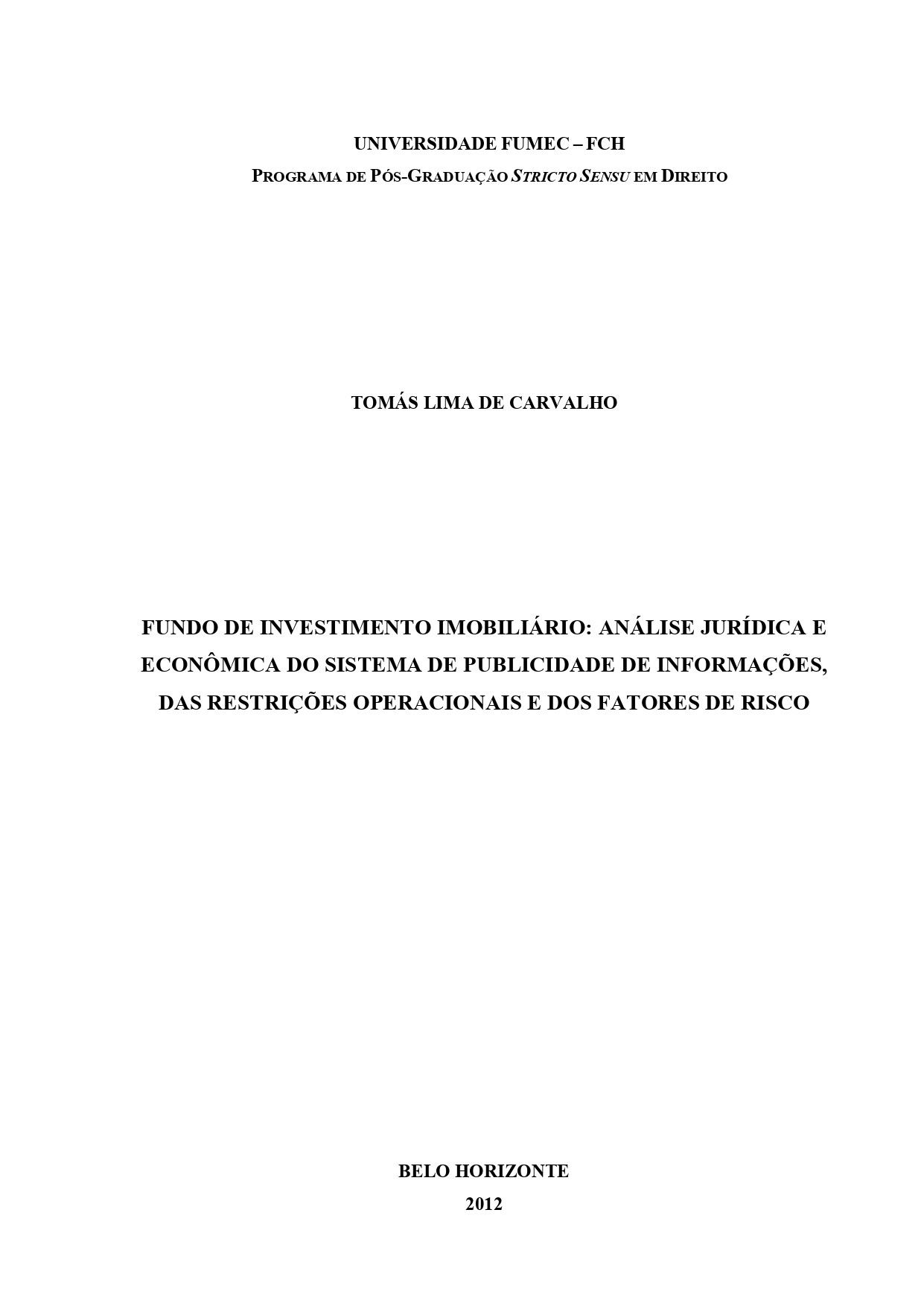Fundo de investimento imobiliário: análise jurídica e econômica do sistema de publicidade de informações, das restrições operacionais e dos fatores de risco

Visualizar/
Data
2012Autor
Carvalho, Tomás Lima de
xmlui.mirage2.itemSummaryView.MetaData
Mostrar registro completoResumo
O fundo de investimento imobiliário constitui uma inovadora modalidade de aplicação de
longo prazo, mediante valor acessível e parcelamento do investimento, pois possibilita a
securitização da propriedade imobiliária e busca oferecer rentabilidade mensal em lastro
imobiliário, sendo que cada fração representa um valor mobiliário. Embora seja da essência
da atividade econômica do mercado financeiro lidar com riscos, há que se ressaltar que as
informações pertinentes relativas aos fatores de risco, às restrições operacionais impostas ao
administrador, empreendedor e cotistas, assim como concernentes aos contornos gerais e
normas jurídicas dos fundos de investimento imobiliário, não estão sendo divulgadas a
contento, de maneira clara e contundente. E essa ausência de informação se mostra relevante
do ponto de vista jurídico e econômico, já que pode culminar no temor, afastamento ou
redução de racionalidade por parte dos investidores, fazendo com que haja alocação
ineficiente de recursos, assunção inesperada de riscos, perda de liquidez ou abstenção de
investimento. Sob a ótica da Análise Econômica do Direito, a eficácia dos fundos em atrair
investidores e oportunizar rentabilidade e liquidez está atrelada à ampla divulgação de
informações sobre o empreendimento imobiliário componente do ativo do fundo e,
principalmente, sobre os aspectos jurídicos inerentes aos fundos de investimento, suas
restrições operacionais e fatores de risco, possibilitando, assim, imprimir maior segurança e
racionalidade aos investidores, reduzindo a assimetria informacional e os custos de transação,
além de imprimir confiança e credibilidade nas operações realizadas no mercado. The Real Estate Investiment Trust is an innovative method of applying long-term value,
through affordable installments and investment subdivision, because it enables the real estate
securitization and seeks to provide monthly return in ballast housing, while each fraction
represents a security. Although the essence of economic activity in the financial markets is
deal with risk, the relevant information concerning risk factors involved in operations with
Real Estate Investiment Trust, the operational restrictions imposed on the administrator,
entrepreneur and investors, as well as concerning the contours general and legal rules of the
Real Estate Investiment Trust, are not being satisfaction as well, clear and forceful. And this
lack of information is relevant from the standpoint of legal and economic, as may culminate
in awe, removal or reduction of rationality on the part of investors, bringing inefficient
allocation of resources, taking unexpected risks, loss of liquidity or refraining from
investment. For Economic Analysis of Law, the effectiveness of the funds to attract investors
and create opportunities profitability and liquidity of these are linked to the broad
dissemination of information, which are not limited to real estate component of the fund
assets, but mainly to legal aspects relating to investment funds, operational constraints and
risk factors, thus enabling greater security printing and rationality to the investors, reducing
the information asymmetry and transaction costs, and print trust and credibility in the market
operations.
